|
|
|
Sort Order |
|
|
|
Items / Page
|
|
|
|
|
|
|
| Srl | Item |
| 1 |
ID:
192610
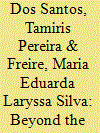

|
|
|
|
|
| Summary/Abstract |
Innovation spreads not only through new technologies but also through new processes and concepts populating international and security studies. Consequently, the popularity of these concepts, extensively diffused across defence documents worldwide, does not emerge alone. Difficulties in estimating how much of them became tacit knowledge and how successfully these new processes and concepts were adopted come as a plus. That scene depicts the diffusion of “interoperability,” quickly aggregated to the defence vocabulary but arguably translated into practice, particularly from an organisational standpoint. Provided that significant challenges lie ahead of regions where the debate still requires a more solid groundwork, this study addressed Brazil’s interoperability state of the art. We performed a qualitative analysis based on the very same referential used in the country’s latest CONOPS in this regard – Tolk’s Measures of Merit in Coalition Operations Model. By doing so, we aimed to establish a dialogue with the current perspective of the country whilst showing that neglecting the organisational aspects of interoperability poses practical consequences, undermining a complete translation of this central capability into practice. We argue that interoperability adoption stands for far more than its reproduction across the defence metier, comprising organisational change underpinned by reforms in civil-military relations..
|
|
|
|
|
|
|
|
|
|
|
|
|
|
|
|
| 2 |
ID:
192603
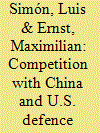

|
|
|
|
|
| Summary/Abstract |
What does the decision to designate China as a “long-term strategic competitor” imply for U.S. defence strategy? To address this question, we draw on net assessment and competitive strategies, two complementary frameworks developed in the U.S. Department of Defense (DoD) during the Cold War to understand and manage long-term competition with the Soviet Union, respectively. Net assessment and competitive strategies are tailored around specific competitors and follow a characteristically dialectical approach to strategic planning, based on complex, recursive calculations of move and countermove. We argue that the identification of China as a long-term strategic competitor has paved the way for an increasingly systematic application of net assessment and competitive strategies within DoD, even if obstacles to such application still remain.
|
|
|
|
|
|
|
|
|
|
|
|
|
|
|
|
| 3 |
ID:
192605
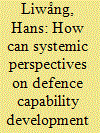

|
|
|
|
|
| Summary/Abstract |
Over the last thirty years, suggestions for how to develop defence capability have developed rapidly. However, supporting theory and structured concept development lag behind. Despite this imbalance, countries need to continuously spend resources on defence development. This study identifies central challenges in relation to the scientific perspectives and approaches needed to support the development of defence capability. The results show that the support for developing interactions between technology and social components is especially weak and that relevant supporting theories and methods from related fields are not considered. This study also shows that it is important to be able to address these questions from various perspectives and not to be limited by a specific scientific tradition. Finally, this study also identifies a possible emerging cluster of reports on capability-related research that provide a base for a much-needed cross-disciplinary approach to the development of defence capability.
|
|
|
|
|
|
|
|
|
|
|
|
|
|
|
|
| 4 |
ID:
192609
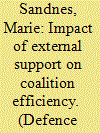

|
|
|
|
|
| Summary/Abstract |
This article examines the extent to which external actors influence the efficiency of the G5 Sahel Joint Force’s (G5S-JF) chain of command and what this means for the relationship between the G5S-JF and external actors. I argue that external actors have taken leading roles within the G5S-JF’s chain of command and that this external influence has increased the efficiency of the joint force’s command. This suggests that the relationship between the G5S-JF and external actors follows the logic of hegemonic theory, with external actors providing efficiency and stability through a strong leading voice, as other scholars have previously assumed. However, I demonstrate that there are limitations to a hegemonic understanding of this relationship, as it does not take into account the agency of the joint force. In fact, as things have developed, the hegemonic stability logic rather appears to have been proven wrong as the strong leading role of external actors was a contributing factor to Mali’s withdrawal in May 2022 and the subsequent instability of the joint force.
|
|
|
|
|
|
|
|
|
|
|
|
|
|
|
|
| 5 |
ID:
192608


|
|
|
|
|
| Summary/Abstract |
Indian military strategy has tended to neglect the link between the conventional and nuclear domains in a nuclear weapons environment. We argue that this anomaly is evident in two broad areas: the conception of “war,” and the complexity produced by new technologies that span the two domains. First, we show with empirical evidence that “limited war” in a nuclear environment is misnomer: the reality is more appropriately called “marginal conflict” owing to its extremely restricted nature. It follows that strategic planning and posture must be tailored accordingly. We then highlight the risk of escalation produced by conventional technologies that carry potential cross-domain nuclear effects, noteably with respect to cyber, artificial intelligence, missile defence and space. We note that the complex strategic effects produced also complicate military-strategic interactions traversing geographic domains, noteably South, Southeast Asia, and Northeast Asia. The paper concludes with some reflections on the reasons for these lacunae in Indian strategic thinking and what might be done about them.
|
|
|
|
|
|
|
|
|
|
|
|
|
|
|
|
| 6 |
ID:
192604
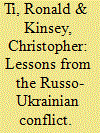

|
|
|
|
|
| Summary/Abstract |
A commonly held view amongst strategists is that strategy leads logistics, and that military logistics, which is the science of sustainment and replenishment, is generally subordinate. The authors of this article contend that in fact the opposite is often true, that logistics frequently has primacy over strategy, and that it is the success or failure of logistics at lower levels of war which exerts the greater effect. The authors illustrate their arguments on this nexus between logistics and strategy, with examples from the current Russo-Ukrainian conflict highlighting how Russian logistic failures have contributed to failure of the strategic plan.
|
|
|
|
|
|
|
|
|
|
|
|
|
|
|
|
| 7 |
ID:
192606


|
|
|
|
|
| Summary/Abstract |
“Multi-domain operations” is an emerging concept that many defence organisations are trying to define and to decide how and when to use as part of their operations and warfighting strategies. This article addresses these questions and specifically identifies how the emerging concept of multi-domain operations, along with escalation management, can fit into the future of the North Atlantic Treaty Organization’s (NATO) warfighting needs. This article examines and debates concepts related to multi-domain operations and deterrence and addresses the importance of maintaining this strategic repertoire within the current geopolitical environment. It uses a European case study to illustrate the uses and impact of multi-domain escalation management. Finally, it provides a holistic view of research innovation in this area and its impact on NATO’s potential usage of multi-domain.
|
|
|
|
|
|
|
|
|
|
|
|
|
|
|
|
| 8 |
ID:
192607


|
|
|
|
|
| Summary/Abstract |
This article retraces and reconstructs the process of developing and launching the European Union’s Military Mobility project. Situated in the agenda-setting and policy-transfer literature, this article explicates the establishment and implementation of the Military Mobility project and helps to explain the entire policy and development process around the Military Mobility initiative to date. By drawing on process tracing, this article methodologically unpacks the process surrounding this policy development at the EU level. The results show that the European Commission has expanded its competences within the defence field by purposefully and politically acting upon the worsened security situation in and around Europe, while actively building coalitions and managing good working relations with the actors involved in the project. Moreover, the findings show that the EU services have learned from NATO in the defence domain. Thus, this analysis contributes to a greater understanding of the new role of the European Commission in the field of EU security and defence policy.
|
|
|
|
|
|
|
|
|
|
|
|
|
|
|
|
|
|
|
|
|